#labour doesn't grant personal value
Explore tagged Tumblr posts
Note
why is it that every anti communist media has to come up with some bullshit that actual communism doesnt do, whether its like that stupid rule of 6 in signalis or the "under communism you cant own anything" bs that capitalists love to parade?
honestly I think die Regel der Sechs is a good example of signalis's specifically-casual anticommunism, as the process here is pretty clear: the developers had an inventory limit for gameplay purposes, which is genuinely a good element of the game design and plays into the game's feel; and wanted to convey that to the player in the early game with a poster, like how they convey information about the sprinting mechanic with a PSA saying to be considerate about the noise you make; and they probably decided that it would be funny if there was a poster saying the reason you could only carry six items on your person was because of Communism No Private Property. signalis doesn't really present an argument against communism so much as it just takes for granted that communism is bad, and incidentally communicates that view due to its use of a retro ostalgie aesthetic.
as for why it's like this in general - communism is, in fact, in the direct interest of the vast majority of the human population, so most anticommunists who aren't diehard nationalists or bourgeois themselves have had to be very carefully reared on a diet of vague anecdotes about stalingrad and the stasi, because if they were ever actually exposed to e.g. the labour theory of value they wouldn't actually oppose it.
228 notes
·
View notes
Text
Mouthwashing notes/analysis: Chapter 2 (Part 2)
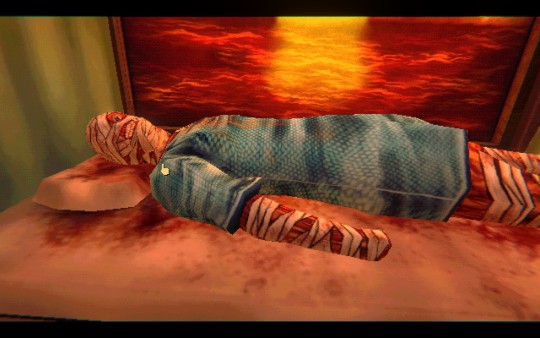
At this point, Mouthwashing has established its premise: four crewmates are stranded on a ship with the captain who sent them to their deaths. It's a classic setup for a revenge story. The player's first encounter with the now-disgraced Curly subverts this expectation. His pain isn't cathartic — it's horrifying.
Curly's model is given greater physicality than the rest of the crew. Their eyes blink — his swivels in its socket, boring into the camera. Their chests rise and fall — Curly breathes, a rasping whine audible above the somber music. We're encouraged not to view him as a collection of texture-wrapped polygons but as a man with a palpable body in palpable agony.
Any threat he once posed has long-since dissipated. He's lost his hands, his feet, his tongue — he can't muster the strength to move his own jaw. Any violence towards Curly would be nothing but sadism.
Curly is missing an eyelid. He's lost the ability to look away. Directing his gaze is his last avenue of voluntary communication, and it's no coincidence that it's always trained on Jimmy.
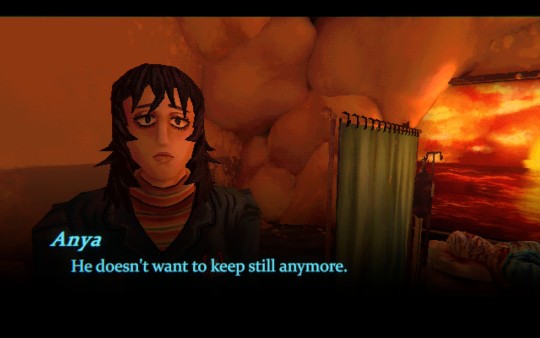
Despite his supposed crime, Anya still values his comfort. Keeping him alive isn't a show of spite or a reluctant insurance measure. Given the blood, bile and god-knows what else currently seeping into the hospital bed, it's not even an act of squeamishness. Anya cares for Curly as a person. She cares what he wants.
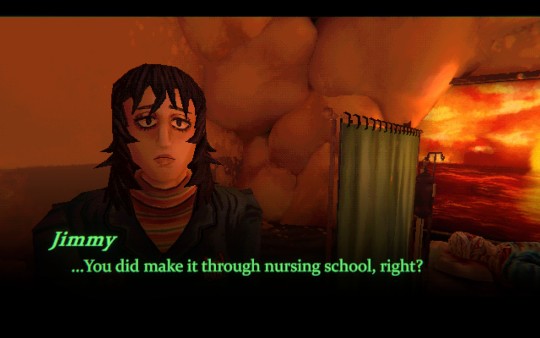
Jimmy's demeanor towards Anya is the first indication of his underlying cruelty.
Her medical inexperience is no fault of her own. She could never have anticipated the situation — she's wearing socks and sandals, unequipped to handle bodily fluids, let alone improvised surgery. Jimmy acknowledges her unqualified status is the fault of Pony Express, but there's no reason to bring it up at all. He's bruising her psyche because he can.
Not only is Anya the only woman onboard, she takes on the most stereotypically feminine role. The majority of nurses are female, the word's very etymology stemming from childrearing and motherhood. Due to this gender disparity and centuries of misogyny, caring professions are often underpaid and undervalued. Anya's labour is unrelenting and traumatic — much of it's likely invisible. Curly can't feed himself, let alone look after his own hygiene. This doesn't stop Jimmy from disparaging her efforts. Swansea and Daisuke have nothing left to contribute, but they're never the targets of his ire. It's something to consider.
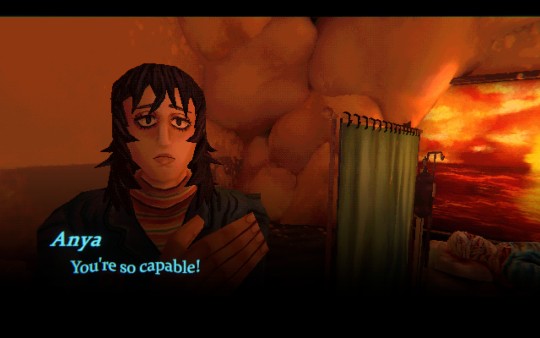
Anya responds to stress by fawning over Jimmy. She's placing undue emphasis on her words, her tone strained and frightened. Her abuser now occupies the highest position of authority. She can't give him the slightest excuse to lash out.

Even with Curly incapacitated, Jimmy still feels threatened by the former captain. He processes his insecurity by deflecting it onto Anya, policing her language in an act of manipulation.
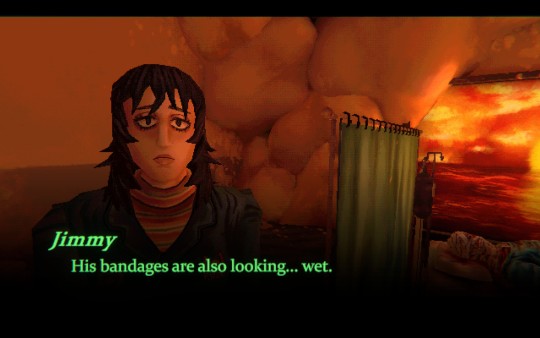
The crew are rationing the food, but two months in, Anya has burnt through the majority of the medical supplies. Her attempts to alleviate Curly's suffering will only come to worsen it.
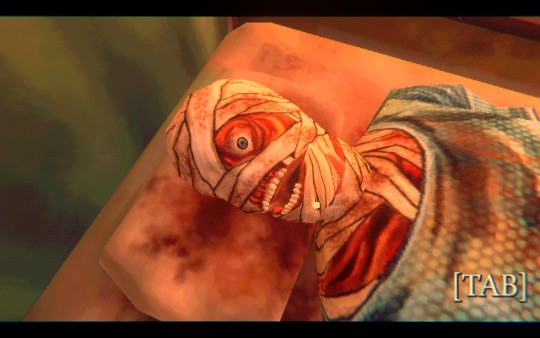
Medicating Curly requires an intermediate step — manually wrenching open his paralysed jaw. Once again, the game's ludonarrative comes into play. Mouthwashing won't let the player abstract this process. We're given a close-up of Curly's skinless face, his bandages soaked in gore, his eye bloodshot and accusatory. We hear the faint, wet sound of his mouth sliding open. It's deliberately a little disgusting, although it pales in comparison to what's to come.
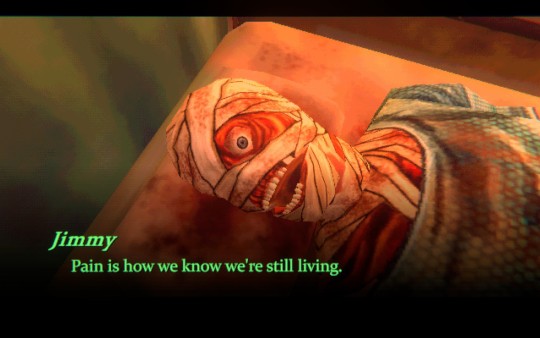
Jimmy's alluding not only to the opioids but to his own botched murder-suicide. They wouldn't be suffering if he had succeeded.
Anya runs outside, in a supposed display of cowardice, although the player has been granted the same leniency. We don't have to watch. Not yet. It's the game's first use of censorship and it won't be the last.
We are provided audio — choking, gasping, struggling, somehow worse by virtue of imagination. Given that Anya can't stomach the thought of violating Curly's autonomy, it's no stretch to say the sound design deliberately evokes sexual violence.
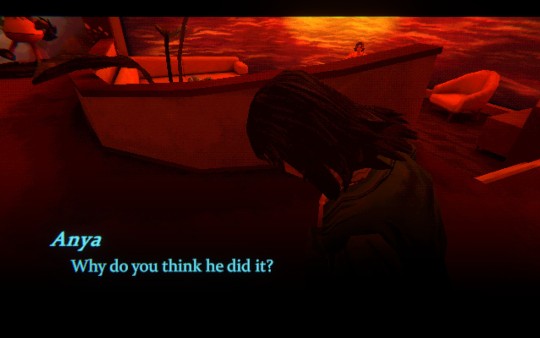
This question isn't targeted at Curly. Anya knows she won't get a real answer, but she can induce a moment of introspection, however brief.
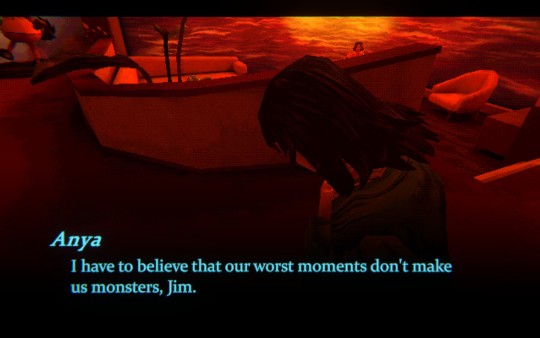
Not only has Anya been assaulted, she has no room to process this trauma. The claustrophobic environment of the Tulpar forces her to remain on speaking terms with her rapist. She's offering Jimmy a second chance, albeit an inorganic one.
In many ways, she's right. Jimmy isn't a monster. He's fully, disquietingly human.
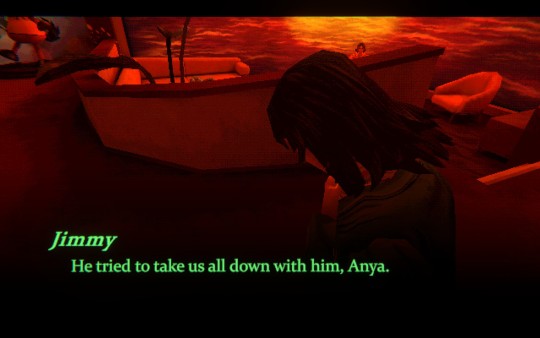
Both Jimmy and Anya know exactly who crashed the ship. In this context, maintaining the fiction is a different kind of self-defence. Jimmy uses cognitive dissonance to deflect the weight of his own guilt. Had he remained in the cockpit, he'd be in Curly's position — the two have swapped places. Jimmy's violence towards his former friend springs from old resentment, but there's also an element of self-harm. He's punishing himself in second-person, but Curly is always the one to suffer.
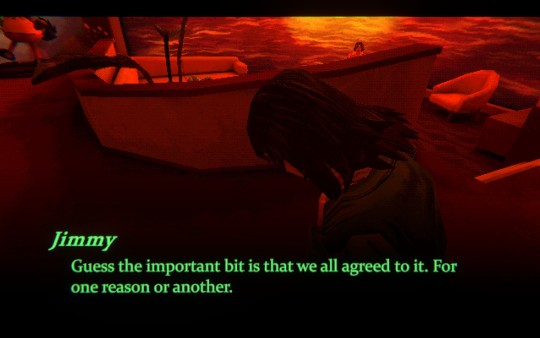
Keeping Curly alive was a unanimous decision.
Swansea holds Curly in nothing but contempt. His continued survival represents supposed karmic justice — he wanted death, so they'll withhold it.
Daisuke holds the opposite view. He harbours a moral aversion to the idea of killing — he's horrified at the thought Anya might euthanise the former captain.
Anya has a personal connection to Curly. Even though he failed her, she still cares about him deeply. She doesn't want to make that decision for him.
Jimmy's 'two reasons' are left ambiguous. It's possible cannibalism was his plan from the outset.
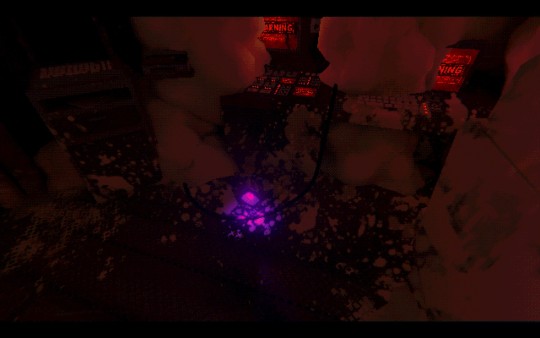
The code scanner was absent from Chapter 1's inventory. Another piece of foreshadowing.
#mouthwashing#mouthwashing analysis#text posting#wrote most of this at 5 AM so it's a little unfocused. i think i'm physically dependent on em-dashes
20 notes
·
View notes
Text

I always thought that Zato-Ino is a really cute send-up of Zatoichi, my fav samurai movie character. It is a massive bummer he only shows up in book one.
You can kinda see how he's meant to resemble Shintaro Katsu, who played Zatoichi in the 1962 - 1989 made-for-TV chanbara movies.
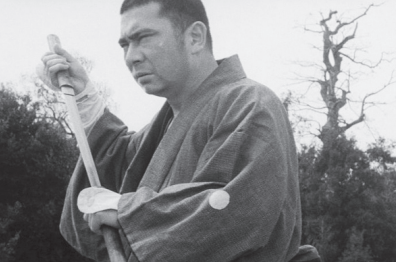
My weebmost trait is that I think the history of blindness throughout East Asia is deeply fascinating. I am a little obsessed with the media tropes that surround it.
So, for those not aware: in a lot of East Asian cultures, massage (or at least specific forms of massage) was historically a profession only the blind were legally allowed to do, mostly as a means of ensuring that they had an income. This has been mystified, tied into spiritualism, suppressed, revived, labelled as ableist, labelled as not-ableist, banned in Japan during the American occupation, restored partially due to the activism of Helen Keller -- it's a whole complex thing.
Today you can find blind-only massage parlours in Japan, Korea, China and Taiwan. Probs elsewhere too, I'm sure.
Anyway,
I'm interested in this because it's an association of disability with specialized labour and there really isn't a western parallel to that.
There's no disability in western media that is associated with a specific profession in nearly so direct a way. The character of the anma masseur allows disability to be explored through class and labour based tropes. Zatoichi worries about landing a gig so he can afford shit, he lives completely independently, and his specific disability grants him an identity that implies all of that at face value.
Meanwhile, the tropes we're mostly associated with in western media tend to cast us as someone overcoming adversity (Barbara Gordon), someone for whom adversity doesn't exist due to cool powers (Daredevil), an opportunity for the protagonist to demonstrate they're a kind person (any and every Hallmark or Lifetime movie with a disabled character), or shitty parasites who need to be fixed / ruin the lives of people around us (What's Eating Gilbert Grape, any American or British movie prior to 1985, or any movie dealing with a difficult mental illness to this day tbh lol).
It's weird, right, I've been steeped in disabled Australian culture pretty much my whole life because so many members of my family have disabilities, myself included, but old dorky samurai movies and comics were the first and to date only real form of media I've encountered where you can observe disability in a context where it is synonymized with a form of work, and that synonymization directly refutes almost every familiar western trope.
It's worth noting the character of the blind masseus shows up in non-period drama pop culture, too, but usually in a transformative way.

Haters do not like Makoto as blind rep and that's fair, she is "cured" at the end and that's its own frustrating trope. But, she kinda has a very clunky portrayal of Neurological Symptom Disorder, what used to be called Conversion Disorder, and specifically what was called Hysterical Blindness before that. It's a real thing, she's just kinda awkwardly written.
And besides her blindness works as a supporting metaphor for Majima's loss of identity, if one takes losing sight in one eye as symbolic of his potentially losing sight of himself as he's forced to be an Ouran High School Host Club Host (Gone Grown Up). See, Makoto's total loss of sight / restoration of sight is directly tied to her loss of self due to the total erasure of her identity due to her specific Sad Backstory and the reality imposed on her by the oppressive immigration system, restored when she meets her brother, learns everything about herself, answers the big mystery of her life and
I love her...
#comics#comic art#stan sakai#usagi yojimbo#chanbara#chambara#zatoichi#disability#disabled#disability in fiction#yakuza 0#majima goro#makoto makimura
2 notes
·
View notes
Note
Carrot 5 and lettuce 3 for the veggie oc questions?
carrot 5: Has your OC ever been involved in farming or agriculture? Or have they tilled the earth in a more modest setting? What is their view of food production in society? Is it something they understand and value? Or do they make little connection between the food they eat and the labour required to produce it?
With most of her life being spent at sea, Roz doesn't have much experience farming/gardening, but she does have fond childhood memories of picking fruit from Nami's tangerine trees 🍊 And while she's never personally struggled with food security necessarily, nutrition is a big concern for all sailors, so she doesn't take food for granted or undervalue the work that goes into it.
lettuce 3: Has your OC ever got into a fit of laughter from which they struggled to recover? What was it that they found so funny? Is it a memory on which they look back fondly?
Oh sure! Roz spent a good chunk of her childhood being entertained by Luffy, whose go-to entertainment method was let's see what weird things we can make my rubber body do. It never failed to get Roz squealing, and seeing a new gum gum trick is still something that she finds delightful, even as a adult. Definitely a class of memory she looks back on fondly.
vegetable symbolism oc questions, if anyone else wants to hop in!
2 notes
·
View notes
Text
this is mostly based on the new champion of shazam comic rather than mary's comics before the n52 reboot so i apologise, but here are some of my thoughts:
- mary has always been trying to prove herself, to mark her impact on the world and find her place. somewhere she belongs. she's always been known as someone's abandoned daughter, the runaway kid, someone's eldest sister, the gifted child, the know it all, and now, the college student. her identity is always based on her relationship to other people or what has happened to her or her skills, but never for who or what she really is.
- due to her past, she herself knows what it's like to be abandoned, forgotten, neglected, considered to be of little to no value. she's also struggling
- one thing i found interesting about her is her admittance that she's not naturally gifted at most things, whatever accomplishments she makes, she has to fight for it, work hard - maybe twice, thrice more than other people to establish that for herself. she works hard, gives her blood sweat and tears until she gets it. her work ethic is further established by the fact that she's a biochem student, pursuing to study at a renowned university by the basis of her merit. she's a planner. she sees the consequences and thinks far ahead. she's holding everybody together because she cares about them and wants to help them, help her family, help her people, if it means putting her own needs on the backburner at times (as made evident by how she was willingly to transfer from her dream college back to her hometown to help find out her missing parents). she's not perfect, but she puts in her best effort. you know she's given her all whether she's certain she'll get the rewards of her labour or not.
- which is an interesting idea compared to how superheroes in general tend to be gifted with superpowers that simplify a hell lot of things. yes, it's not easy or luxurious for most superheroes and they still have to train their powers, but you get the idea.
- additionally, let's remember mary's feminist origins: while not the first superheroine, her creation still played a revolutionary role, being an equal to her male counterparts and being a proactive hero in her own right and not reduced to someone's sidekick, love interest, or victim. vassar college also had some feminist significance, being one of the first universities in the usa to grant women degrees and encouraging their academic excellence.
- i also think about like how, her younger siblings have probably figured out the hero thing way earlier than she did. billy looks completely different as shazam, but mary bromfield and mary marvel aren't that different; she's entering the field much later, while billy, darla, and eugene will get more time to polish their skills.
- still, at the end of the day, which is why I personally am biased towards the foster family retcon for the marvel family: mary gets to learn that it's not about competing to be the best or proving herself. she doesn't need to earn anything, because she will always have an undeniable place in her family. unconditional love and support.
i am so insane about mary marvel particularly the idea when she's the eldest daughter and also an adult. will expand later
#this is not a polished character analysis. more like the ramblings of a mad woman#still i love mary. i wish dc could write her and the rest of the shazamily with more purpose :(
23 notes
·
View notes
Text
two-for-one
lol came for one post, but realized i still had more stuff on my mind that i wanted to say.
after eid, shit sort of went south between yasir and i. everything sort of came to a boiling point and erupted...i'd rather not sit here and type out ALL the details but basically my mom got into it with his mom and after that eid weekend, i stayed at my parents' place for an additional week (totally unplanned).
during that week i really was ready to go and file for separation or divorce or whatever.
but after letting my anger cool and realizing exactly how much work a divorce or separation would be - not to mention how much of a HUGE money/asset suck it would end up being...i decided that i would go back. so i went back. and i was willing to try and put in my effort also. but at the end of the week, another incident happened which sort of sealed my brain from yasir for a long long time.
i know, i know i'm speaking SOOO mysteriously, as if my life's shit is worth this much secrecy. it's not - i'm being private and i know the value in keeping certain details of my life to myself (this i've only begun to learn recently also - and it doesn't have anything to do with nazar or evil eye....which by the way is a personal pet peeve of mine but let's not get into THAT).
ANYWAY, all this rambling just to tell you i haven't even gotten CLOSE to the point i wanted this post to be about.
so here i am, back at home with my husband. and i'm angry. and i'm letting myself be angry and hurt and resentful. and frankly, i'm okay with it. because at least for now - i'm not gaslighting myself into thinking that what i'm angry about is not worth being angry over.
so i'm letting it happen.
the other major change i've made is i've completely and totally given up hope that yasir will even understand, recognize or take part in the domestic labour in the house or the 10 million extra things i do or think about in a day as they relate to child rearing our kid.
so i'm doing it all by myself and even when he's actively helping out here and there...i'm not asking for it.
sorry - to be clear - i'm not asking for it anymore.
a few days ago, i was talking to my mom and sister and i was telling them how i've been praying with all my heart that Allah grant me sabr. and my mom started about how she's praying with all her heart that yasir changes or realizes and sees the need to change.
to which, i told her you can pray all you want but it's not going to happen mama. that's why i'm not even BOTHERING to pray for that part of my prayer. despite wanting to see change, despite wanting to have him accept his responsibilities as a husband, father, and just a regular ADULT, i'm not actually making dua for it.
to which my sister replied with something i'll never ever ever forget.
she said "what, why not!? why aren't you praying for Allah to change yasir and to help him see and hear the things you are asking for!? are you really going to sit there and tell me YOU DON'T BELIEVE HE CAN CHANGE A HUMAN?"
i was floored.
i didn't pray for something because I REALLY THOUGHT THE MAKER OF ALL MANKIND COULDN'T CHANGE MANKIND!?
am i a fucking idiot or what.
anyway....that's probably also the thing that's making my whole body shake with the dua of forgiveness.
and now i'm actively trying my best to ask of Him what i KNOW him to be capable of giving and providing me - which is everything under the sun and over it and around it and all the way through all the galaxies and all the lands and all the realms.
kun faya kun - be, and it is.
that is what Allah has said about His ability. so how could i be so stupid?
that's all.
much love,
k
3 notes
·
View notes
Text
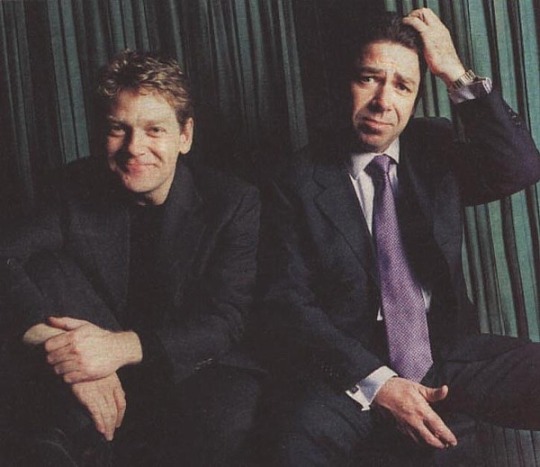
(photo from Branagh Compendium)
Relative Values: Bill and Kenneth Branagh
by Ann McFerran, Sunday Times (London), 1 August 1999
Bill and Kenneth Branagh were born in Belfast and moved to Reading in 1970 when Bill was 14 and Ken 9. Bill left school at 16, and after college had a successful career in the IT and telecom industry. Now 43, he is managing director of Case Technology, an independent manufacturer of voice and data conversion technology. He and his wife, Sally, have two daughters, Kim, 18, and Nicky, 13, and live near Reading. Kenneth, 38, won the Most Promising Newcomer award for his role in Another Country in 1982. He has directed and starred in the films Henry V and Much Ado About Nothing, directed the films Mary Shelley's Frankenstein and In the Bleak Midwinter, and starred in several Shakespeare plays. He is starring in Paul Greengrass's Theory of Flight and Barry Sonnenfeld's Wild Wild West, and has directed and stars in his own film of Love's Labour's Lost, due out later this year. His six-year marriage to the actress Emma Thompson ended in divorce in 1995. He lives in London. Their sister, Joyce, 29, will direct Hamlet at the Tivoli Theatre, Dublin, in November.
BILL: Ken was a regular little boy growing up in Belfast, who played football in the street. When my father went away he'd bring us back a little matchbox car. I used to keep mine pristine clean, but Ken used to take the tyres off his.
Coming to England was very difficult for both of us. No one understood what I said, including the English teacher. I think Ken adapted more quickly than I did - he's great at accents. He was always a massive reader. At 12 he wrote to the editor of the local paper saying wouldn't it be a good idea if a child reviewed books, to give a child's perspective. His bedroom became like an Aladdin's cave. We kept the press cuttings - Branagh's Junior Book Shelf. A while back, my younger daughter said: "Do you think I could do that, Dad?" She wrote to the same paper and asked. The paper did a piece: "Branagh's niece is keeping up the family tradition."
I think Belfast made us driven individuals. We're both extremely competitive - I don't like to be second best. Nor does Ken. He hates it. When we came to England, Ken and I were determined to be responsible for our own destiny. In Belfast, no matter how talented you are, there's this underlying current of bigotry which is indoctrinated into kids. Ken single-mindedly set out to achieve what he wanted. There was no way my parents could afford drama school - he had to get a grant from Berkshire, the first they'd given for drama for years.
Ken looks like my mother, but in character he's more like my father - he doesn't wear his heart on his sleeve. My mother's incredibly emotional, as am I. We have big arguments, and as a child I could make her cry, and she could make me cry. Ken and my father hide their feelings.
As the eldest I was the trailblazer. I started living with the lady who's now my wife when I was 18. To my parents, I was living in sin. But when my brother did it at a similar age, it was just: "Oh, Ken's moving in with his girlfriend."
After Ken did Fortunes of War with Emma Thompson, his life became quite public. He hated stories about him in the press. I was offered money to talk about him; my folks had journalists camped outside their front door. It was awful. There were rumours and all sorts of nonsense. I think the press scared him witless. When he and Emma did get married it was on the front page of several newspapers. Ken just said to us: "Don't get involved. Once you do, the press won't leave you alone." Since then we've never spoken publicly. Sometimes I've denied that I'm anything to do with Ken. "Any relation?" people will say. If I say, "He's my little brother," they say, "Lovely," and don't know what to say next.
Emma's a smashing girl and as down-to-earth a person as you will ever meet. She was very close to my family and treated my girls like adults. She and Ken weren't luvvies, like the Spitting Image crap. When the marriage broke down I felt extremely protective. I was just Ken's big brother. The press were camped outside Emma's door and giving Ken grief. Awful.
I get asked about sibling rivalry, what do I feel about Ken's success and am I jealous? No. We do such different things. I get a huge vicarious pleasure from his success. I get to go to the first nights, the Oscars, the premieres; I've been on the set of every film he's done and I've met fantastically famous people, including royalty.
Ken has very little time when he can just chill and kick back. He built a house about a year ago, but last year he only spent six weeks in it. I wish he could spend more time there, rather than hotel rooms. He needs to be able to relax and smell the flowers. It would help his peace of mind. Luckily, he's someone who can snatch sleep at any time. He has a photo frame that has a dozen pictures of him sleeping, in any and every position. the caption says: "The Director at Work." For Henry V he had a van with a bed in it so he could sleep on his way to the studio.
Ken leads as ordinary a life as he can. He watches TV, goes to football matches, phones his mum once a week. Ken and I go down to his local and nobody hassles us. He and Tom Cruise, who's a mate, went out one night. When they drew up to the traffic lights, some girls pulled up, did a classic double take and stalled. That's fame! When my wife and I went to the Oscars as Ken's guest, we realised how bloody famous he was in the US. There he's known as Mr Shakespeare, and people like Glenn Close come up to shake his hand.
I've been asked many, many times to be interviewed with Ken. This is the first time I've ever talked about him. I'm fiercely proud - I'm going to make it because of me and not because I have a brother who happens to be famous. Now I'm in a very senior position and I don't need a step up the ladder. So I can speak about him just as my kid brother. And I love him to death.
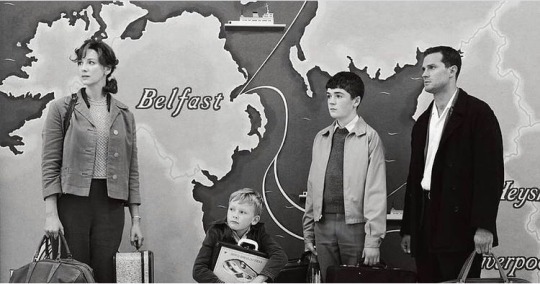
The 2021 film version of Kenneth, Bill, and their parents
KENNETH: Bill and I were working-class Belfast boys, living in a street where everybody knew everybody else. The area was predominantly Protestant, but there was a smattering of Catholics. Everybody got on. It sounds cliched, but there was a real sense of community. We had a large extended family - my mother was one of nine, my father one of five. Life in Belfast was very grounded and family-orientated, and Bill and I were thrown together - we shared a bed when I was six, seven, eight. I remember being in bed next to him, and whichever book he wasn't reading for school I'd pick up. So I was introduced to Shakespeare through him. We were both very taken by the story of Animal Farm, although we couldn't quite work it out. I remember being struck by the phrase "All animals are equal, but some are more equal than others." You could see that was true for some people in Belfast.
There, the cardinal sin was to show off or make a fuss. "Don't start getting worked up about money. And don't have any ideas above your station." That was my parents' philosophy. To them, money was only important for putting a roof over your head; it wasn't an end in itself. And a person's religion made no difference to my parents, though not everyone in Belfast shared that view. My dad was a Protestant, but he was never in the Orange Order; he disliked all that marching lark.
My mum and dad always said that when you grew up you should do whatever makes you happy - though of course they were nervous of me going into the theatre, entering a world they knew nothing about. The first play I ever saw was A Christmas Carol, starring Jospeh Tomlety, a famous old Irish actor, at the Grove theatre in Belfast. I went with Bill and I was struck by how magical it was.
Bill's a much more emotionally fiery individual than me. He's very like my mother. They've always had a frisky relationship. They have a spat, get it out, then it's all hugs. It's like it's therapeutic for the pair of them. My father and I are more contained and find it quite hard to show our feelings. I can lose my rag, but in the end I'd rather have a quiet life.
Bill's much more gregarious than me. I think that social side of me goes into my work. And both he and my mum would definitely take the bullet for you. If anything remotely endangers the family, they're just blind allegiance.
My mother had just got pregnant with my sister when things became quite intense in Belfast, especially around our era - the Troubles. One night Bill came running up our street saying: "Get in the house, get in the house!" We heard a terrible buzzing noise. Just as he was dragging me in, I saw a sort of cloud at the bottom of the street, which turned out to be a huge bomb. Bill pushed Mum and me under a table in the back room. We didn't know it then, but the terrible noise we'd heard was the mob outside, who were picking up the iron gratings from the drains at the side of the roads and throwing them through the windows of the Catholic houses. I was hysterical, Bill was peeping out the curtain and Mum was saying: "Get down, get down!" A couple of hours later, there were barricades at the top and bottom of the street, while the men divided themselves into vigilante groups. Our street had turned into a war zone overnight.
In the wake of that, my parents felt uneasy about Belfast. My father, who was a joiner, had been offered a job in England, which was more at a management level, and they decided to take the opportunity. But none of us was very happy. Being from Belfast made you quite unpopular in England, so it was a pretty difficult time.
I was miserable. I did a lot of weeping and wailing. Bill was a bit more stiff-upper-lip. He got stuck in and lost his accent almost immediately. He was 14, and I think it was tougher for him when people took the mickey. At that age, with your hormones swirling round, you just want to be like everybody else. I found it quite difficult to be understood for a while, but I was a bit more sneaky. I began to use an English accent at school and an Irish one at home. I found myself very conflicted over that, and slightly ashamed.
Bill and I were lucky in being reasonably good at games, so we began to fit in. My mother, taken away from her family in belfast, felt quite isolated. We'd also stepped up in terms of class. Our house was bigger, and we'd become lower middle class, with all of those material, educational and cultural expectations.
In comparison with Bill, I was a relatively solitary adolescent. I spent time in the house reading while he was being social and breaking all the rules.
The move to England felt at times like some kind of betrayal. The transformation from that very grounded Belfast life, with its comfortable and simple expectations, had a profound effect on me. But I didn't fight to get it out of my system the way Bill did. And subsequently I carried much more baggage. Maybe the whole acting game was a way of hiding or escaping from it. When I try and do my psychobabble analysis of it, I feel that only now do I have a strong sense of who I am in the way that I did in Belfast.
Maybe the world of acting has shaped itself for me partly as a search for a sort of extended family that I felt absolutely secure and at home in. Over the years, I've developed a loose but large repertory company of people in films and theatre who have become like family - people like Richard Briers, Brian Blessed, etc.
I developed good performance skills, playing at being something I thought was expected of me. As an actor, you lose a bit of yourself on the way; you're not really sure what reality is because you've been tricking yourself for so long. Finally, the sand settles on some hybrid version of who you are - whatever that is!
Today I'm less conflicted and guilt-ridden. And, believe me, Jews and Catholics don't have a monopoly on guilt. The Protestant work ethic was branded on my forehead: if you are fit and talented it is your duty to use it. At times I've dealt with my good fortune by thinking: "At least I'm putting myself under pressure and giving myself less time to enjoy my good fortune!"
In England, my and Bill's lives began to be even more different. He went into computer networking and got married quite young. His marriage and family have been a real education for me. The kids are great. My nieces are healthily disrespectful of me, and they're tickled by curious little bits of my celebrity, like when I've worked with someone like Leonardo DiCaprio. It's interesting to see Bill deal with things with his kids that my parents never did, like sex, drugs, the Internet. Bill's changed a lot, but he's still very driven. He's a terrific salesman and businessman, and sometimes I think he'd be a rather good actor.
For Bill - and maybe this is an Irish thing - the family is immensely important, and he has an unquestioning loyalty to it. I know he's always there for me and I'd happily talk to him about anything. If it was a terrible crisis in the middle of the night, there'd be no "How could you possibly have this, you idiot?" Our relationship has become very simple, like having a really good mate. We meet up, have a pint and a game of snooker, but we know we'd walk over glass for each other.
https://www.branaghcompendium.com/artic-billken99.htm

(photo from The Reading Chronicle, 1 August 2017 https://www.readingchronicle.co.uk/news/15444806.sir-kenneth-branagh-took-time-out-of-his-busy-schedule-to-visit-his-brother-bill-for-sonning-golf-clubs-charity-fundraiser/)
Remember… I can speak about him just as my kid brother. And I love him to death. — Bill Branagh
#Tait rhymes with hat#Good times#Branagh Brothers#London Sunday Times#1 August 1999#Branagh Compendium#BelfastMovie
35 notes
·
View notes
Text
The Swarm - Just Philippot
youtube
I recently watched this and on face value its very much on brand for fear mongering insect cinema. (It is completely seperate from the 1978 film of the same title) Although its delivery and underpinning narratives are much more subtle.
The film follows widower and locust farmer Virginie and her two children, Teenager Laura and boy Gaston. Virginie is in severe debt and is struggling to support her small family. This is made worse by her broods not breeding at the same rate as market demand and the overall market value plummeting. Her small frame and the demanding physical labour of the farm is clearly communicated as her mental state struggles to keep up with the adversity she faces.
The locusts are presented in accordance with thier long established interuptation. They clammer on top of eachother, mindlessly with intermittent close ups that express human distrust. Virginie handles the "livestock" very mechanically. The locusts are a product that are not acknowledged by virginie. She crashes in and gets the job done. Her son Gaston however keeps a handful as pets. He lovingly handles them and is the first person to interact with arc of the story. He notices that one of the locusts eats his wart off. He attempts to tell his mother about this but she is too busy and stressed to give this any focus. This is a recurrent theme in the film. Virginies inability to be a attentive parent. There is a definite but heavily masked feminine narrative running throughout. I just can't identify whether it's Feminist or sexist in nature nor can I distinguish how the locusts may interact with this element.
Viriginie asks for and is offered help by her deceased husbands brother and love interest Karim (which is interesting as for viriginie this relationship is presented as a guilty interaction even amoral where as Karim is presented as a giving, helpful and heroic supporting character throughout). He helps her both directly and indirectly. He gives her cash and pays off a duck farmer to buy some of her locust feed so she receives the full amount. She finds out about this and becomes overrun with rage. Lashing out at the duck farmer and continuing to destroy her small locust eco-farm. Female rage is a recurrent theme in the film as later we see this contrasted with her daughter, Laura, who destroys a locust holding. Interestingly both females do this as they feel cheated and lied too. However Laura has been cheated by her mother in a much more direct, unjust way. Whereas virginie doing the same is in reaction to being cared for. Both character operate this rage with a disregard for the locusts inhabiting these holdings.
Virginie for the majority of the film is lacking maternal figure and the director takes low-key opportunities to illuminate it I.e she constantly forget Gastons soccer schedule, she isn't present when he gets sent off to camp (you even hear the contrast of an off screen mother say "good bye lovely! Love you!) She promises moving to her daughter only to retract it. Virginie is presented as bad mother for the most part. Her persistent hard labour and relentless drive to keep the family above water is presented more as a need not to fail. An idea the film address within its dialogue "do you think I can do this?" Is a question that pops up continously from Virginie and is supported by her humiliation when she discovers she is being helped.
When Virginie destroys her locust pod she injures herself and hits her head. She awakes to find a countless locusts feeding on her open wounds. Visually this is presented in a very uncomfortable way. Not directly within the "horror" genre but instead to inspire disgust. We see the locusts close up chomping her wound. She awakes to panic and quickly bats them off. We are then presented with a close of her picking remnants of locust mouth parts out of her open wound.
There is a very important moment that follows. It communicates the catalyst for the plot. We see a close up of one the locusts that fed on Virginie. It is molting and has doubled in size. This stood out to me because this transformative locust state is so easily manipulated by the artistic lens. In the context of horror with all the trapping of triggering sound makes us view this with disgust. The same scene however could easily be given ambient noise and become more biophilic. After this molt virginie discovers this brood are thriving and have bred in excess of the numbers she needed.
Its from this first molt that the film begins to increase in pace. She realises the broods need blood. Her farm continues to expand and the tents containing long suspended bags begin to look an abatour.
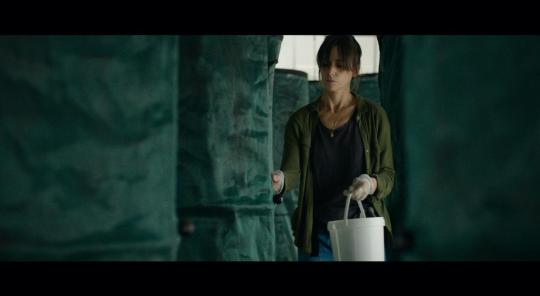
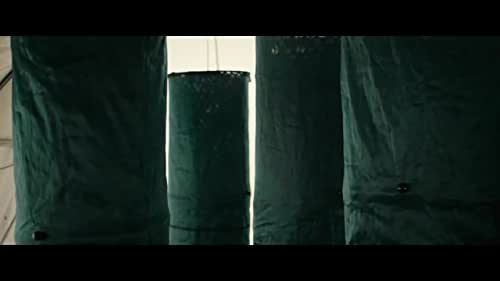
Abatour-esque scenes
The locust chirping becomes an overwhelming continous screech that is in conjuction with Virginie depreciating mental state and further emotional neglect of her family. The locust blood sources escalate starting with bought live stock blood, a neighbours dog, the family pet goat and ultimately herself. She becomes more deluded, unstable and weak with every feed as she looses more and more blood. She is interestingly referred to in a insulting way as "Queen of the locust" and the "locust Queen" by one of Laura's school bullies. This felt deliberate as it relates to insect social structures, although not specifically Locusts. It's is a sentiment that mirrors her descent. She is the epicentre for there survival and much like a queen bee she automatically and quite literally sit centrally within there home. She becomes there prisoner.
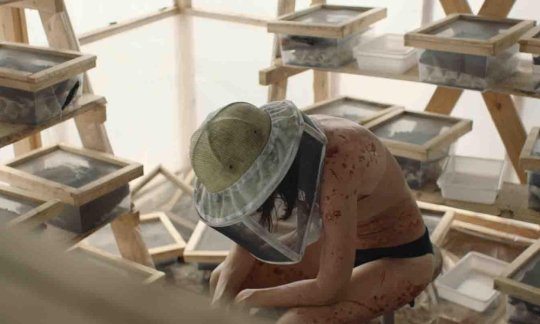
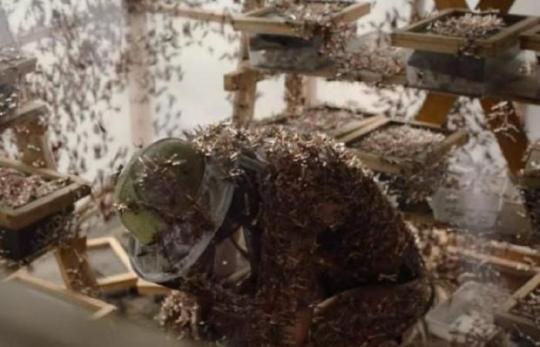
Virginies descent
The Biblical narrative of locusts is often referenced within the film. Infact the destruction of the broods pods both female characters exhibit act as a punishment. When virginie destroys a brood hold she is superficially granted her wish. Although this is more old testament parable in nature. The treat is a trick, blood hungry locusts! Viriginie destroys the holding out of pride and greed its a sinful action for which she is punished. However when Laura does the same the outcome is much worse. The bloodsucking insects chase the family goat (which they eat and virginie discovers a mile away). The use of the goat is an interesting choice in this case, especially in the way in get sacrificed inadvertently to the locusts. Goats connote all the satanic and Biblical mystism to support this religious dynamic in the film. The goat is presented as an true innocent in the film however and a symbol of the family's togetherness. This seems to function as a warning for Viriginie. A test and failed recalibration of her parenting which is unfortunately temporary. Her son is grief stricken by the "lost" goat and she drives round with him trying to find it. She becomes more attentive and surprises both children with things they want. Gaston gets to go to football camp and Laura gets a moped. However she returns to her compulsive and tunnel visioned existence not long after. Her morality dissolves and she becomes broken.
The film concludes with Karim discovering a neighbours body in a brood tent. This happens after a terrified Laura calls for help and he becomes aware of the fragile and dangerous household dynamic. He instantly begins to set fire to the tents and a uncontrollable virginie emerges hysterical. The burning doesn't work. The Swarm consumes Karim and he dies a hero. The locusts pursue Laura and the mother sacrifices herself for her daughter, but survives.
There's ALOT in this film that hasn't been thoroughly address. At the center of "The Swarm," is the harm done by the agricultural industry and our limited food resources. Much like the 1950s atomic panic cinema boom (addressed in my previous posts) The Swarm sits on social anxiety and projects it onto insect populations. Virginie is the perfect vessel for human anxiety - desperate, unstable, weak and largely unlikeable. This was likely deliberate by Philippot as he remarks on the film
"The Swarm' is also political, not just a fantasy film or a genre film."
Overall the film is highly biophobic although very well presented. I enjoyed it but from the perspective of my research its terrible propaganda for insects. Philippot also presents women in a really shitty way whilst all the men are presented favourably. I'm Not sure what function this serves, perhaps an additional social anxiety or he's just bad at writing women.
0 notes
Photo
On time I was helping an acquaintance to promote his small town law business by leaving flyers at small business. I was between jobs, had to wait out some health issues to start the interview wheel again, and it seemed a good thing to spend my early summer morning in. Plus he was giving me a tip.
So I walk into the rattiest English academy I've ever seen. This is Catalonia, Spain, even in a small village like ours, there are at least six language academies, but this one was so poorly designed it even seemed something shady.
At the reception area I could only hear a heavy accented person speaking English in one of the rooms. There was no one else in sight. I timidly said "Hello?", and the person speaking English called me in. She was the teacher, teaching a little girl who looked kind of scared. Once I'd said my bit about the flyer, she looked at me slyly and said "Now in English". So I summoned my calmest demeanor and my best Recieved Pronounciation and repeat my technical speach.
If I suspected before, I knew then that she had meant to shame me and use me as a cautionary tale for that little, struggling kid in her one to one English class. But her face was slowly falling into shame instead. She asked if I was a native speaker. I said no. She asked if I had studied English at an academy. I said no, just public school. She asked what did I do for a living. I said I was taking a break from corporate work, enjoying the fresh air and talking to actual people. It was technically a lie but I didn't feel like disclosing my health to a mean-spirited stranger. She asked me to pronounce a few words for her little student to hear, then took my flyer and, as I left I heard her trying to step up her pronounciation.
It was one of my proudest Fuck You Elitists moments. The bourgeoisie is short sighted and disrespectful, but I find it even more disgusting when working class believe they are better than other fellow workers just because they found a job in wich they usually don't sweat or get dirty.
We are all the same. Our choices, our circumstances, they don't make us less than others, and they certainly don't make us a cautionary tale.
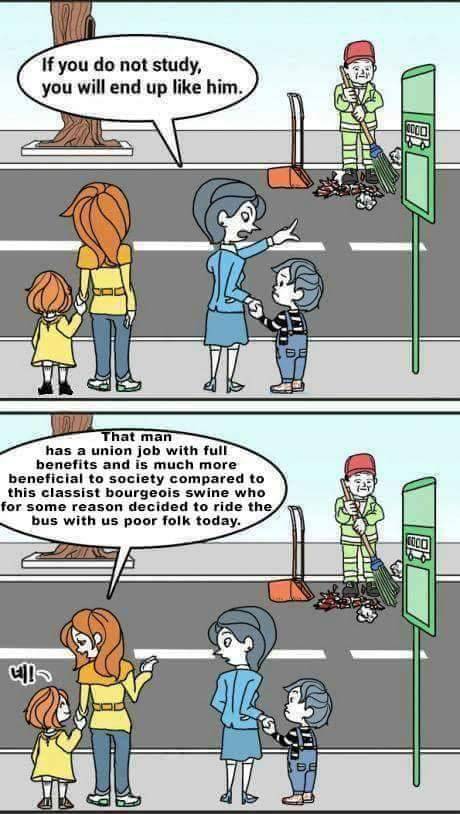
#there is no unskilled labour#labour doesn't grant personal value#fuck capitalism#fuck elitism#fuck the rich#fuck the bourgeois#fuck classism
362K notes
·
View notes
Text
Thankk :v:
I-I have another two posts worth of DG rant but my ability to form sentences is awful rn also I forgot a chunk of text cuz it was too long lmao
But anyway I’m glad it made some sense bc the plot guides us through n to Garou's perspective but not a lot of DG's real thought process.
DG is criticized for his “jealousy”, “shallowness” n seen as a fool but just bc he lost terribly, n his execution of plans didn't go well, doesn't mean he's a clown to dismiss. Follow his experiences, n we see his logic has its reasons.
The situation escalated to a “foolish” degree bc of deeply rooted flaws to the hero system, from the attitude of elite heroes to the efficiency and fairness of the management level.
Sentiments of discontent stem from complex systemic issues which set heroes on the wrong path as it drives them to develop problematic mentalities under an unjust environment.
Worked their ass off only to be overshadowed n belittled by S-class, effort n voice ignored. Who wouldn't want to defend themselves from such harassment n neglect?
Its reasonable to feel violated and want to prove yourself when you are undervalued by who you work under.
His decisions may be affected by emotion but his anguish is valid and so is his frustration.
Actually it's the similar for Garou, he was bullied by peers, then humiliated n ignored by the very authority figures who should have judged fairly n given him chance to tell his side of story.
Their affiliation led them to fight each other but if we get down to the root of motives, DeathGat n Garou actually fight for the very same fairness which is really the fault of a corrupt system of heroism and the warped representations of it.
When smb is put down by the very figures who should support them, they'll grow disillusioned, disgruntled, cynical even. They will be fed up w their superiors and would do whatever they can to retrieve their dignity, no matter how extreme or ostensibly ridiculous.
An employer should remember their employees do not work FOR them, they work WITH them.
A general cannot fight a war without their army, and the foundation of battalions is foot soldiers.
Nobody works tediously under another for free, labour should not be taken for granted. One cannot demean others n expect no comeback.
They want to be heard, not just seen as an icon for their roles.
They want to know they matter, bc they do, and they should be equally valued for all the big and little ways they support and contributed to HA n the public.
HA favours S-class for their tremendous power, but if they valued heroism, then every hero who embody it should be just as valued too.
(the weird chunk v) __________________________________________and tbh who would just let a sudden mysterious threat run free with an apocalypse to deal with?
not to mention smb who targets heroes, the paranormal exorcism police of the OPMverse.
Garou disabled heroes at a time when they were needed n already short handed, for obstruction of justice alone he was a formidable threat.
Here “justice” is duty. Not some vague concept anymore, but the very duty of heroes to protect ppl who cannot fend for themselves.
No matter how a hero ranks, or how morally heroic, all can help someway or another.
Personal grievances aside, what decent person would want their coworkers immobilized, esp. at such a critical time.
. . . Ok no, DG did get his squad hospitalized but more on it later bc it's not on purpose. __________________________________________ Last part of the first re: ^
Idk how to explain it but Death Gatling has the Tragedy eyes. The contrast itself carries nuanced character and it strikes me as a sort of sorrow(?), a frustrated sorrow and angst and latent misery.
Oh, and fatigue. Chronic, permanent, fatigue. Like ”it hurt but it no longer hurts because it hurt so much it is now numb” sort of…wearines? I suppose.
Such a gloomy but steadfast character.
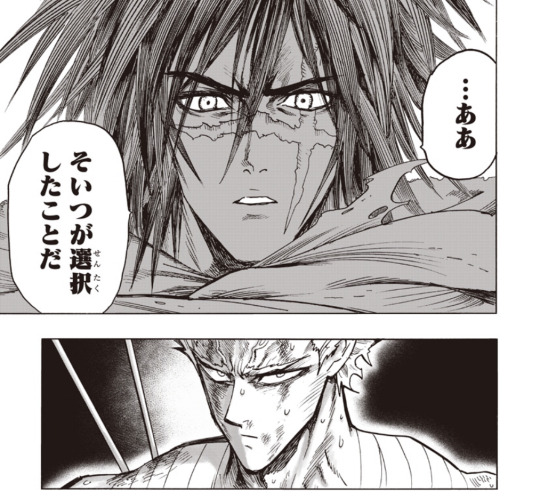
I never paid attention to him until now when I reread the story n his character just struck me as a curious one cuz the realistic maturity of his outlook and somewhat overly simplistic ways of his logic contrast and contradict himself yet still work out somehow.
I could ask what exactly is justice, or I could ask how do you implement it? Is it valid and viable at all?
As child I hated the fickle concept of justice and heroism, I still do not quite get along with it, but I also know I must recognize my own bias because it blocks you out from the whole picture sometimes and adamant adherence to one side can become detrimental.
As a side note I thought the part when DG monologued his “LOOK AT ME I AM AN A CLASS RANK 8 HERO (etc etc)” sounded rly out of context and abrupt for the manga fight. It would make sense for the webcomic where he went alone but as the manga had a group it felt misplaced.
ON ANOTHER NOTE, I read the untranslated description n it says 顔は怖いけど愚直な正義漢 and so literally a foolishly honest righteous lad. Or straightforward ig.
Bet he was a class prefect. …wait, is he the type of person to defend people like a stubborn child
。。。
ah i forgot, damn, what’s the word for it…
english come back-
41 notes
·
View notes